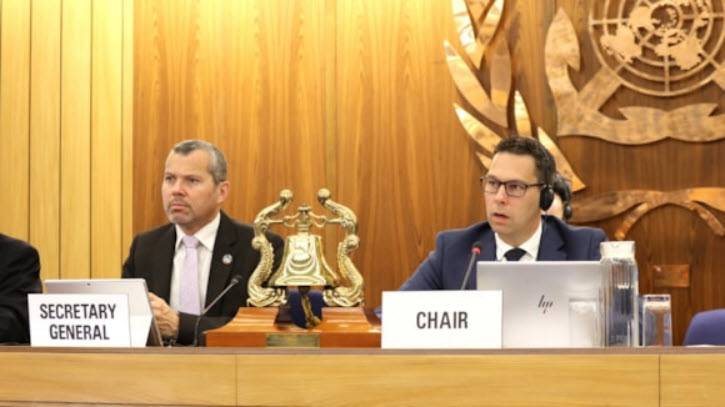IMO Finalizes Pilot Transfer Regulations
The IMO's Sub-Committee on Navigation, Communications and Search and Rescue (NCSR) met from June 3 to 14 at IMO headquarters in London, covering a range of issues including maritime pilot safety, improving the security and integrity of AIS, and the dissemination of information over multiple recognized mobile satellite services under the Global Maritime Distress and Safety System (GMDSS).
Pilot transfer arrangements and amendments to SOLAS regulation V/23 agreed

To improve compliance and address inconsistencies and ambiguities in existing regulations, the Sub-Committee finalized draft amendments to SOLAS regulation V/23 and associated instruments on the safety of pilot transfer arrangements.
The Sub-Committee also finalized a draft MSC resolution on performance standards for pilot transfer arrangements, including detailed requirements for design, manufacture, construction, rigging, installation of pilot ladder winch reels, operational readiness, onboard inspection and maintenance, familiarization and approval in relation to pilot transfer arrangements required under SOLAS regulation V/23.
In addition, the Sub-Committee finalized a draft MSC circular on Voluntary early implementation of the amendments to SOLAS regulation V/23 on pilot transfer arrangements.
All the above will be submitted to the upcoming session of the Maritime Safety Committee (MSC 109) in December 2024, with a view to approval.
Performance standards for NAVDAT and criteria for providing a NAVDAT service agreed
NAVDAT is a digital broadcasting system operating on selected medium and high frequency (MF and HF) bands. It can communicate texts, images, graphs and data to compatible receiving equipment on ships, at speeds much higher than NAVTEX.
The Sub-Committee finalized new performance standards for the reception of maritime safety information (MSI) and search and rescue (SAR) related information by MF and HF digital navigational data (NAVDAT) system.
The Sub-Committee also approved a draft revision of resolution MSC.509(105) on provision of radio services for the GMDSS which includes criteria for providing a NAVDAT service.
Both resolutions will be submitted to MSC 109 for adoption.
Further work on NAVDAT implementation will continue to be considered at future sessions of the NCSR Sub-Committee.
Introduction of VHF Data Exchange System (VDES) - SOLAS amendments in development
The Sub-Committee continued discussions on the introduction of the proposed VHF Data Exchange System (VDES) into the SOLAS framework, including the development of related performance standards and guidelines.
VDES is a radiocommunication system in the VHF maritime mobile band, capable of exchanging digital data faster than AIS in the ship-to-ship, ship-to-shore and shore-to-ship directions, using both terrestrial and satellite components.
The Sub-Committee re-established the Correspondence Group on VHF Data Exchange System (VDES) and instructed it to finalize the draft amendments to SOLAS chapter V, including consequential amendments, the draft performance standards for VDES as a navigational equipment and the draft guidelines for the operational use of shipborne VDES.
The Correspondence Group will submit a report to the next session of the Sub-Committee (NCSR 12).
Development of guidelines for electronic nautical publications
The Sub-Committee established a correspondence group on guidelines for the use of electronic nautical publications (ENP) and instructed it to finalize the draft guidelines for ENP use and submit a report to NCSR 12.
Revised criteria for the provision of mobile satellite communication systems in the GMDSS and charges for distress, urgency and safety communications agreed
The Sub-Committee agreed to a draft Assembly resolution revising the Criteria for the provision of mobile satellite communication systems in the GMDSS (resolution A.1001(25)). The resolution sets out the requirements for satellite communications systems to be recognized as a service provider in the GMDSS as well as for the oversight of such services.
The Sub-Committee also agreed to a draft Assembly resolution on charges for distress, urgency and safety communications messages through recognized mobile satellite services in the GMDSS. The resolution revises resolution A.707(17), which specifies charging policies for distress, urgency and safety communications via RMSSs, applicable to both shore authorities and ship stations.
The above resolutions will be submitted for approval by MSC 109, with a view to subsequent adoption by the forthcoming 34th session of the IMO Assembly in 2025 (Assembly 34).
Revised Performance standards for a universal AIS agreed
The Sub-Committee continued its work on possible measures to prevent manipulation of AIS transmissions and tampering of AIS transponders.
The Sub-Committee agreed to a draft MSC resolution revising the Performance standards for a universal shipborne AIS (resolution MSC.74(69)) which enhances the existing requirement for providing the IMO ship identification number as part of the static AIS information (or an "official flag State number", where the ship has no IMO number).
The resolution also introduces a new requirement for broadcasting a "unique manufacturer equipment identification number", which should also be physically marked on the equipment. The draft resolution will be submitted for adoption by MSC 109.
Draft amendments to the IAMSAR Manual agreed
The Sub-Committee agreed to draft amendments to the IAMSAR Manual, jointly published by IMO and the International Civil Aviation Organization (ICAO). The three-volume manual provides guidelines for a common aeronautical and maritime approach to organizing and providing search and rescue services.
The draft amendments will be submitted to MSC109 for approval, and thereafter will become applicable 12 months after approval.
Ships’ routing measures
The Sub-Committee agreed the following ships’ routing measures, for submission to MSC 109 for adoption:
• revised Recommendations on navigation for containerships in traffic separation schemes Off Vlieland, Terschelling-German Bight, Off Friesland and German Bight western approach;
• areas to be avoided off the Brazilian southeast coast – Santos Basin; and
• no anchoring area off Hook of Holland.
